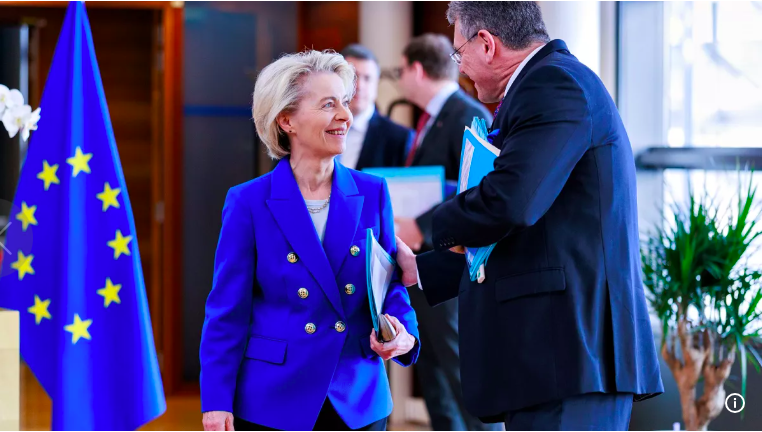"EU Welcomes Trump’s 90-Day Tariff Pause Amid Global Trade Tensions"

Trump’s Tariff Pause Gives EU Breathing Room—But Brussels Remains Cautious
The European Union is taking a cautious but hopeful stance following Donald Trump’s unexpected decision to temporarily pause his sweeping tariff plan. Under immense pressure from financial markets and international stakeholders, the former U.S. President has agreed to a 90-day freeze on his proposed "reciprocal tariffs," which many feared could spark a global recession.
European Commission President Ursula von der Leyen welcomed the move, calling it “an important step towards stabilising the global economy.” Her Thursday statement emphasised the importance of clear and predictable trade conditions, which she said are essential for the proper functioning of international supply chains.
Trump’s decision marks a notable reversal from his earlier hardline stance. Just days before the pause was announced, he rejected von der Leyen’s offer for a comprehensive “zero-for-zero” tariff agreement on industrial goods between the EU and the U.S. Instead, Trump insisted the EU should sharply increase its purchases of American energy products to balance a persistent trade deficit in goods.
In 2023, the EU recorded a €156.6 billion surplus in goods trade with the U.S., although this was offset in part by a €108.6 billion deficit in services. Trump’s call for more energy purchases suggests he views this imbalance as unfair, despite the broader economic context and structural differences between the two economies.
Relief in Brussels, But No Celebration Yet
Despite the pause, Trump’s tariffs have already left their mark. The EU was initially targeted with a 20% rate under the now-paused “reciprocal tariffs.” Following the reversal, EU exports to the U.S. are subject to a lower, but still significant, 10% tariff. Meanwhile, strategic sectors like steel, aluminium, and automobiles continue to face a steep 25% duty.
For now, the European Commission has opted not to escalate the situation. While member states approved a first wave of countermeasures targeting U.S. steel and aluminium tariffs, officials say broader retaliatory plans have been paused. A Commission spokesperson said Brussels would now take time to "assess this latest development" in close coordination with EU governments and industry stakeholders before deciding on next steps.
This measured approach reflects both relief and caution. While the tariff pause de-escalates immediate tensions, it does not resolve the underlying disagreements between Washington and Brussels. The EU is especially wary of the precedent Trump's tariffs could set and the economic uncertainty they could still unleash.
Rising Global Stakes
Beyond the U.S.-EU dynamic, Trump’s tariff regime has sent shockwaves around the globe. Most countries are now facing the same 10% baseline tariff on their exports to the U.S. But China has borne the brunt of the policy, with certain exports slapped with a staggering 125% tariff.
This massive hike has triggered fears of a trade redirection, as Chinese companies—many of which are heavily subsidised—look for alternative markets to absorb the shock. In response, the European Commission has created a task force to monitor whether those goods are being diverted into the European market, which could threaten EU producers.
“We are staying vigilant,” von der Leyen said, adding that the EU remains committed to diversifying its global trade relationships. She emphasised the bloc’s recent free-trade agreements with Switzerland, Mexico, and the Mercosur group in Latin America. Negotiations are also underway for a new pact with India, a rapidly growing economy with increasing strategic relevance.
The Road Ahead
European leaders are now using the 90-day window to urge deeper dialogue and compromise. Polish Prime Minister Donald Tusk appealed to both sides of the Atlantic to make good use of the temporary reprieve. “Maintaining close transatlantic relations is a common responsibility of Europeans and Americans, regardless of temporary turbulence,” he posted on social media.
Von der Leyen echoed that sentiment, reiterating the EU’s commitment to "constructive negotiations" and to securing “frictionless and mutually beneficial trade.” Yet, she also signalled that the bloc is prepared to defend its interests if talks fail.
"My team and I will continue to work day and night to protect European consumers, workers and businesses," she said. "Together, Europeans will emerge stronger from this crisis."
As the 90-day clock ticks, much remains uncertain. Will Trump return to his tariff crusade? Will the EU and U.S. find a path toward a durable trade accord? For now, Brussels is breathing a sigh of relief—but its hands are far from off the wheel.
Conclusion
Donald Trump’s 90-day pause on sweeping tariffs has given the European Union a vital window to regroup, reassess, and reengage diplomatically. While the immediate threat of a global trade war has been averted—for now—the deeper issues at the heart of the transatlantic economic relationship remain unresolved. The EU, under Ursula von der Leyen’s leadership, is choosing caution over confrontation, emphasising the importance of stability, predictability, and cooperation. As talks unfold, the next three months will be critical in shaping the future of EU-U.S. trade relations. Whether this pause leads to progress or further disruption will depend on the willingness of both sides to find common ground and commit to a more balanced, mutually beneficial framework.
- Art
- Causes
- Crafts
- Dance
- Drinks
- Film
- Fitness
- Food
- Jocuri
- Gardening
- Health
- Home
- Literature
- Music
- Networking
- Alte
- Party
- Religion
- Shopping
- Sports
- Theater
- Wellness


